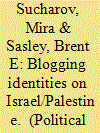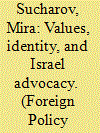|
|
|
Sort Order |
|
|
|
Items / Page
|
|
|
|
|
|
|
| Srl | Item |
| 1 |
ID:
131557


|
|
|
|
|
| Publication |
2014.
|
| Summary/Abstract |
Drawing on our research and blogging on Israel and the Israeli-Palestinian conflict, we make three claims about the role of scholar-bloggers in the social media age. First, as scholar-bloggers with some degree of ethno-national attachments related to our area of expertise, we contend that we are well positioned to issue the kinds of critiques that may resonate more deeply due to the very subjectivity that some perceive as a liability. Second, through the melding of scholarly arguments with popular writing forms, scholar-bloggers are uniquely poised to be at the forefront of public engagement and political literacy both with social media publics and with students. Third, the subjectivity hazard is an intrinsic part of any type of research and writing, whether that writing is aimed at a scholarly audience or any other, and should not be used as an argument against academic involvement in social media. Ultimately, subjectivities of both consumers and producers can evolve through these highly interactive media, a dynamic that deserves further examination.
|
|
|
|
|
|
|
|
|
|
|
|
|
|
|
|
| 2 |
ID:
097069


|
|
|
|
|
| Publication |
2010.
|
| Summary/Abstract |
This article argues that using graphic novels is an effective and valuable pedagogical tool to enhance the teaching of international relations, and specifically the Israeli-Palestinian conflict. Graphic novels combine the best of film and prose in delivering a cognitive and affective experience that allows students to access the subject matter in a manner that complements the use of more conventional textbooks. Three such novels-Palestine, by Joe Sacco (2001), Exit Wounds, by Rutu Modan (2007), and Waltz with Bashir, by Ari Folman and David Polonsky (2009)-raise a number of important and relevant themes such as life under occupation and the shadow of terrorism, the intractability of conflict, the sources of violence, tensions within Israeli society, and collective memory and identity. After reviewing these three novels, this article discusses the benefits and challenges associated with using graphic novels in the political science classroom.
|
|
|
|
|
|
|
|
|
|
|
|
|
|
|
|
| 3 |
ID:
108184


|
|
|
|
|
| Publication |
2011.
|
| Summary/Abstract |
What do we care about-or pretend to care about-when we try to sway hearts and minds through political action? The question of values and value trade-offs in International Relations is understudied. By examining Diaspora-based Israel advocacy (the set of political and educational activities at the school, campus, community and formal political levels designed to increase support by Diaspora Jews, their co-citizens, and their governments for Israel), this paper interrogates the idea of "Jewish values," and theorizes about how actors negotiate among sentiment, aspiration, and values. The evidence suggests that Jews are more likely to invoke "Jewish values" when engaging in in-group critique, whereas Israel advocates are more likely to draw on universal values to defend Israeli goals and actions to others. The essay identifies five value clusters that appear to structure Israel advocacy activities: nationalism and sovereignty, democracy, science, history, and peace, identifies some potential value conflicts that may result, and raises questions about the strategic use of values in social mobilization.
|
|
|
|
|
|
|
|
|
|
|
|
|
|
|
|
|
|
|
|
|